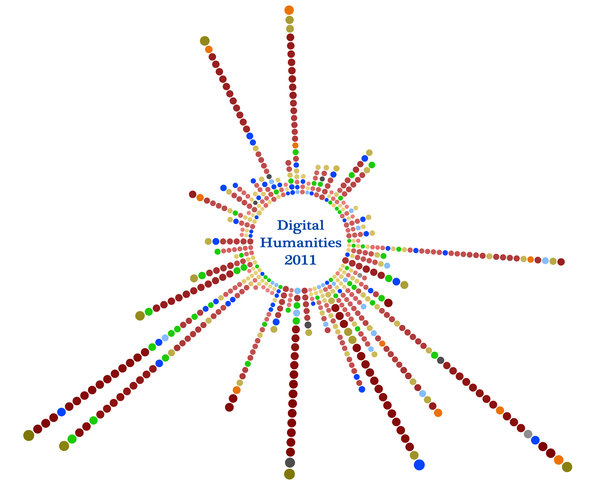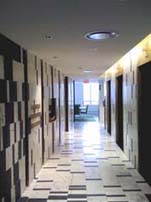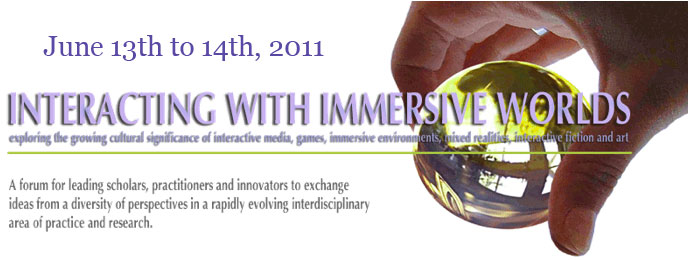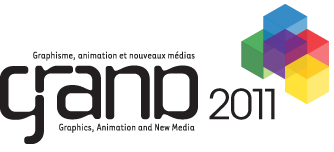The folk at Illinois have put together a database of conference abstracts from past years of what is now called the Digital Humanities conference. See Digital Humanities Abstracts: Search Form. At the moment they only have 5 years of abstracts (1998 to 2005), but more will be added.
Category: Conference
Digital Humanities 2011: Big Tent Digital Humanities
I’m at Digital Humanities 2011: Big Tent Digital Humanities at Stanford University. I was involved in two workshops before the conference on Visualization for Literary History and Text Analysis with Voyeur. (You can see the script to the Voyeur one at DH2011 Voyeur Tools.) I’m also involved in a paper on “Computing in Canada: A History of the Incunabular Years” presented by Victoria Smith and a panel on The Interface to the Collection organized by the INKE Interface Design team. One gratifying thing to see is the visibility of the University of Alberta in the DH 2011 Visualizations set up by the conference organizers. If you zoom in to the different visualizations you will see the number of participants from U of A.
Humanities (dot) Net
As part of the CHCI annual conference at the Toronto Jackman Humanities Institute they scheduled a special day with centerNet titled “Humanities (dot) Net”. The program is on 2011 Annual Meeting « Consortium of Humanities Centers and Institutes (scroll down). The event is a bringing together of these two associations of centres connected to the humanities, one digital and one “traditional.” Of course there is nothing traditional to the CHCI centers. Some of the things that link us include:
- Interdisciplinarity. Of course, interdisciplinarity happens at all levels and in all sorts of organizations, including departments, but generally it is centers/institutes that develop structures for encouraging interdisciplinarity.
- Collaboration. Both types of centres structure forms of collaboration. I think the CHCI centres tend to be more conservative, often also supporting “lone” scholars, but we both try to imagine ways of bringing the right people together for research and learning.
- Legitimization and Leadership. Both types of centres can serve to legitimize activities that are not always recognized. They lead by recognizing new interdisciplinary configurations through fellowships, project support, workshops and so on.
- Experimenting with Futures. Both types of centers can be sites of experimentation with new types of courses, new collaborations, and new research practices. Experiments emerge out of reflection which is why these centers are a site for thinking through where the humanities are going.
Humanities (dot) net as an event brings together leaders in both types of centres to learn about each other and to reflect together on the agenda of the humanities.
Dyson and the International Center for the History of Electronic Games
 At Interacting with Immersive Worlds J. P. Dyson gave a great talk about “Immersion In and Out of Virtual Worlds.” He is the Director of the International Center for the History of Electronic Games (ICHEG) in Rochester which is associated with the Natioal Museum of Play and the National Toy Hall of Fame.
At Interacting with Immersive Worlds J. P. Dyson gave a great talk about “Immersion In and Out of Virtual Worlds.” He is the Director of the International Center for the History of Electronic Games (ICHEG) in Rochester which is associated with the Natioal Museum of Play and the National Toy Hall of Fame.
He mentioned how some of the toys inducted into the Hall of Fame include the Cardboard Box and Stick.
The ICHEG has some 27,000+ artifacts including video games, game system hardware, arcade games (in cabinets) and papers from people like Ralph H. Baer and Will Wright’s. They have an interesting interpretative framework online titled, Concentric Circles: A Lens for Exploring the History of Electronic Games (see bottom of page for link to PDF).
Dyson’s talk traced a history from toy soldiers (H. G. Wells and “Floor Play”) to Dungeons and Dragons to text adventure games. He talked about Romanticism and changes is our ideas about childhood and play. He talked about the new (for Victorians) places for play like the nurseries and gardents, the availability of toys, and the leisure time for play or other foms of immersion (like reading novels.) I’m convinced we need to pay a lot more time to the history of toys and children’s play in order to understand computer games.
Interacting with Immersive Worlds Conference
I’m at the Interacting with Immersive Worlds Conference at Brock University. I gave a paper on Computer Games and Canada’s Digital Economy. The paper is based on work we did with a SSHRC Knowledge Synthesis Grant on the subject (See the PDF of full report). Sean Gouglas led the team. I helped with the interviews of professionals in 3 cities (Vancouver, Toronto, and Montreal.) Two research assistants, Shannon Lucky and Joyce Yu did a careful content analysis of the interviews which was the focus of the Brock paper. The full report includes other sections on independent game development, serious games, and a survey of programmes across Canada.
Canadians at Digging
Digging Into Data Conference
I’m now at the Digging Into Data Challenge Conference. This conference brings together investigators from the first round of the Digging Into Data Challenge. Thursday morning we had a meeting with the folks from CLIR who are evaluating the program. See my Conference Notes. The major issues I see are:
- Gender representation is an issue. The Challenge and in the digital humanities in general we need to work harder to involve women researchers, especially as leaders. We run the risk of DH being seen as the last bastion of old me in the humanities.
- Representation by new scholars is also an issue. The Challenge should bring together the graduate students and the new faculty – they need to be encouraged to meet up and they need the validation of attention from the research councils.
- Supporting international research. One of the innovations of Digging is that it has one review process that crossed national boundaries. If your project was approved all the national partners got funded. We should see this model generalized beyond the digital humanities.
- Encouraging research mashups. Another benefit of Digging is that it encouraged established projects to interoperation. The project I’m on (Datamining with Criminal Intent) built interoperability between the Old Bailey project, Zotero and Voyeur.
- Encouraging ambitious projects. Digging encouraged ambitious and “blue-sky” proposals that experimented with large datasets.
We had a wide-ranging conversation about the challenge of the digital humanities in general. Many of the usual issues came up. Can the Digging Into Data Challenge be a visible advocate for some of the changes we have been grousing about for years.
SDH-SEMI 2011 Conference Report
I just got back from Congress 2011 where I attended and presented at the SDH-SEMI conference. See my SDH-SEMI 2011 Conference Report. Chad Gaffield, President of the Social Sciences and Humanities Research Council of Canada, attended a session. At the end he asked us what difference the digital makes. What he meant by the question was how the digital has changed the humanities (if at all.) As he makes the case for the humanities in general and fields like humanities computing, he needs help articulating (briefly in an “elevator speech”) the innovation and transformative effects of the digital on scholarship. One could debate whether the digital is really transformative or more a magnifying effect, but politically he has a chance to influence the federal government’s Digital Economy Strategy and show the relevance of the humanities to the digital economy. We need to help him make the case for the value of the arts and humanities in such a strategy.
Here are some of the points that I gathered from the discussion for my conference report:
- Scale: The digital has made possible research on a different scale of evidence, collaboration and public engagement. We have collections of thousands of digital of books that can be searched, we can collaborate across time zones using conferencing tools, and we can engage the public through the web.
- Formalized Methods: The digital allows us to formalize research methods and implement them on computers. Concording was one of the first research tasks that was automated; now we can imagine new methods. It is also the case that the act of formalizing methods for implementation teaches us about the limits of methods and triggers discussion of what can be formalized.
- Careers: Integrating digital humanities training into the humanities has given students a broader range of career opportunities. Students with significant training in digital methods can contribute a unique combination of critical thinking and technical experience to the projects they choose.
- Interdisciplinarity: The digital humanities brings together different disciplines in order to complete projects. Digital humanists typically work together with librarians, information scientists, interface designers, and computer scientists. This is in addition to the breadth of humanities disciplines that meet in the commons of the digital humanities.
- Creative and Communicative Practice: The digital humanities is often distinguished by the creation of digital scholarly works. It thus combines the traditional excellence of the humanities in critical approaches with practice based research around creating communicative objects.
- Playful: The digital humanities is increasingly looking at games and fabrication as forms of digital practice. These can be the site for playful research that both engages play as a subject but also recognizes playful practices in serious research.
- Community Engagement: The web allows us to break down barriers to public engagement in scholarship. It allows us to share research resources of interest to people directly with them. Crowdsourcing projects can bring the interested public into collaborations that generate new research. Such public engagement allows us to make clear how the humanities is really about what matters to people – their histories, stories, and culture.
GRAND 2011 Conference
I’m at the GRAND 2011 Conference. GRAND is a Networks of Centres of Excellence funded project that brings together researchers across Canada and across disciplines to study gaming, animation, and new media. I am part of two subprojects. In one we are developing smartphone augmented reality games for learning and health. In another we are developing gestural and performance games. Our fearless leader, Kellogg S. Booth (UBC), opened today’s events talking about the network.
Having organized large groups and participated in others, I’m impressed by how GRAND gently gathers us. We are coerced by the network, though we do have to report carefully.
See my conference notes for more on the conference.
Beware Social Media’s Surprising Dark Side, Scholars Warn CEO’s
Jeffrey R. Young has an article in the Technology section of The Chronicle of Higher Education enjoining us to Beware Social Media’s Surprising Dark Side, Scholars Warn CEO’s (March 20, 2011). The article is about a South by Southwest Interactive conference that brought together researchers and industry.
One of the big trends is using crowdsourcing or micropayments to get work done for free or very little. Jonathan Zittrain, a Harvard law professor warned that this could be exploitative.
Mr. Zittrain began his argument against crowdsourcing with the story of the Mechanical Turk, a machine in the 18th century that was said to play chess as well as a human. But the contraption was a showy fraud; a man hidden inside moved the arms of a turban-wearing mannequin. Amazon, the online shopping giant, now offers a crowdsourcing service it calls Mechanical Turk, which lets anyone, for a fee, commission unseen hands to work on tasks like proofreading documents or identifying artists in musical recordings.
The similarity of crowdsourcing to a man shoved inside a box means the practice isn’t exactly worker-friendly, the professor argued. “In fact, it’s an actual digital sweatshop,” he said of the many sites that use the approach.
Fees paid for crowdsourced tasks are usually so meager that they could not possibly earn participants a living wage, Mr. Zittrain argued. He is familiar with one group drawn to the services: poor graduate students seeking spending money.
I wonder if anyone has proposed a code of ethics for crowdsourcing? Thanks to Megan for sending this to me.





